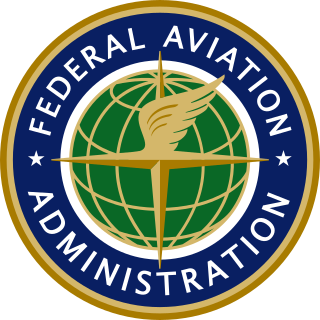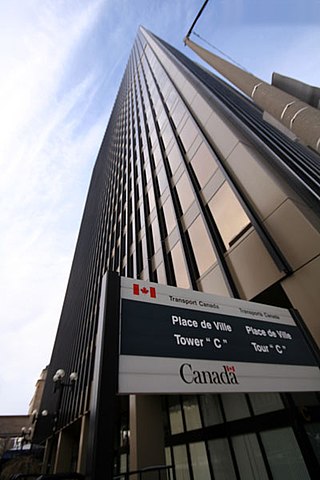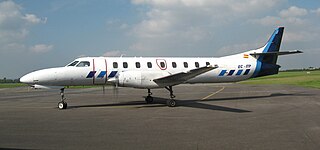
The Federal Aviation Administration (FAA) is a U.S. federal government agency within the U.S. Department of Transportation which regulates civil aviation in the United States and surrounding international waters. Its powers include air traffic control, certification of personnel and aircraft, setting standards for airports, and protection of U.S. assets during the launch or re-entry of commercial space vehicles, powers over neighboring international waters were delegated to the FAA by authority of the International Civil Aviation Organization.
The Joint Aviation Authorities (JAA) was an associated body of the European Civil Aviation Conference representing the civil aviation regulatory authorities of a number of European States who had agreed to co-operate in developing and implementing common safety regulatory standards and procedures. It was not a regulatory body, regulation being achieved through the member authorities. It was in existence from 1970 until disbanded in 2009. Its headquarters were located in Hoofddorp near Schiphol airport in Netherlands.

The European Union Aviation Safety Agency (EASA) is an agency of the European Union (EU) with responsibility for civil aviation safety. It carries out certification, regulation and standardisation and also performs investigation and monitoring. It collects and analyses safety data, drafts and advises on safety legislation and co-ordinates with similar organisations in other parts of the world.

Transport Canada is the department within the Government of Canada responsible for developing regulations, policies and services of road, rail, marine and air transportation in Canada. It is part of the Transportation, Infrastructure and Communities (TIC) portfolio. The current Minister of Transport is Pablo Rodriguez. Transport Canada is headquartered in Ottawa, Ontario.

The European Organisation for the Safety of Air Navigation, commonly known as Eurocontrol, is an international organisation working to achieve safe and seamless air traffic management across Europe. Founded in 1960, Eurocontrol currently has 41 member states with headquarters in Brussels, Belgium. It has several local sites as well, including an Innovation Hub in Brétigny-sur-Orge, France, the Aviation Learning Centre (ALC) in Luxembourg, and the Maastricht Upper Area Control Centre (MUAC) in Maastricht, the Netherlands. The organisation employs approximately two thousand people, and operates with an annual budget in excess of half a billion Euro.

The European Civil Aviation Conference (ECAC) or Conférence Européenne de l'Aviation Civile (CEAC) is an intergovernmental organization which was established by the International Civil Aviation Organization (ICAO) and the Council of Europe. It is located in Neuilly-sur-Seine in France. Founded in 1955 with 19 member states, the ECAC now totals 44 members, including all 27 EU, 31 of the 32 European Aviation Safety Agency member states, and all 41 EUROCONTROL member states. ECAC "promotes the continued development of a safe, efficient and sustainable European air transport system. In doing so, it seeks to harmonise civil aviation policies and practices amongst its Member States and promote understanding on policy matters between its Member States and other parts of the world."
The International Aviation Safety Assessment Program is a program established by the U.S. Federal Aviation Administration (FAA) in 1992. The program is designed to evaluate the ability of a country's civil aviation authority or other regulatory body to adhere to international aviation safety standards and recommended practices for personnel licensing, aircraft operations and aircraft airworthiness.

The Civil Aviation Authority of the Philippines is the civil aviation authority of the Philippines and is responsible for implementing policies on civil aviation to assure safe, economic and efficient air travel. The agency also investigates aviation accidents via its Aircraft Accident Investigation and Inquiry Board. Formerly the Air Transportation Office, it is an independent regulatory body attached to the Department of Transportation for the purpose of policy coordination.
The Civil Aviation Safety and Security Oversight Agency (CASSOA) is an administrative agency of the East African Community (EAC), with headquarters in Entebbe, Uganda. CASSOA's responsibilities include airworthiness inspections of aircraft and airport facilities in the East African area of Kenya, Tanzania and Uganda. Rwanda, South Sudan, the Democratic Republic of the Congo and Burundi are currently merging their aviation bureaucracies with CASSOA. The agency is working with the Civil Aviation Authorities of the six member states to harmonise their aviation regulations, such that a licence acquired in one state should be valid in all of the others. The agency also organises training for member states.
A civil aviation authority (CAA) is a national or supranational statutory authority that oversees the regulation of civil aviation, including the maintenance of an aircraft register.
The Modification and Replacement Parts Association is the Washington, D.C.-based trade association that represents manufacturers of government-approved after market aircraft parts. These aircraft parts are often known as PMA parts, from the acronym for Parts Manufacturer Approval. The manufacture of PMA parts is regulated in the United States by the Federal Aviation Administration.

The Air Force Safety Center is a field operating agency with headquarters at Kirtland Air Force Base, New Mexico, United States.

The Directorate General of Civil Aviation (DGCA) is a statutory body of the Government of India to regulate civil aviation in India. It became a statutory body under the Aircraft (Amendment) Act, 2020. The DGCA investigates aviation accidents and incidents, maintains all regulations related to aviation and is responsible for issuance of licenses pertaining to aviation like PPL's, SPL's and CPL's in India. It is headquartered along Sri Aurobindo Marg, opposite Safdarjung Airport, in New Delhi. The Government of India is planning to replace the organisation with a Civil Aviation Authority (CAA), modelled on the lines of the American Federal Aviation Administration (FAA).
Nuclear law is the law related to the peaceful uses of nuclear science and technology.

Manx2 Flight 7100 was a scheduled commercial flight from Belfast, Northern Ireland, to Cork, Republic of Ireland. On 10 February 2011, the Fairchild Metro III aircraft flying the route with ten passengers and two crew on board crashed on its third attempt to land at Cork Airport in foggy conditions. Six people, including both pilots, died. Six passengers survived but were injured, four of them seriously.
The International Association of Aviation Personnel Schools is a worldwide association of pilot schools. The organization was created on 25 October 1995, and was later renamed in 2009 to also include aviation schools not located in Europe.

The Boeing 737 MAX was initially certified in 2017 by the U.S. Federal Aviation Administration (FAA) and the European Union Aviation Safety Agency (EASA). Global regulators grounded the plane in 2019 following fatal crashes of Lion Air Flight 610 and Ethiopian Airlines Flight 302. Both crashes were linked to the Maneuvering Characteristics Augmentation System (MCAS), a new automatic flight control feature. Investigations into both crashes determined that Boeing and the FAA favored cost-saving solutions, which ultimately produced a flawed design of the MCAS instead. The FAA's Organization Designation Authorization program, allowing manufacturers to act on its behalf, was also questioned for weakening its oversight of Boeing.
The Bosnia and Herzegovina Directorate of Civil Aviation is a government office of Bosnia and Herzegovina charged with performing oversight and regulatory actions for civil aviation and air traffic control. Its current Director General is Čedomir Šušnjar. It was admitted to the European Civil Aviation Conference in November of 2002, and is an International Civil Aviation Organization member state. Though not part of EASA, it is one of EASA's pan-European partners and cooperates with EASA on the implementation of EASA safety rules.